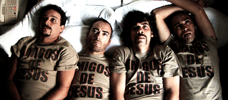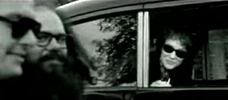Reviews
Robert Redford
USA, 2007
Credits
Review by Tom Huddleston
Posted on 02 November 2007
Source 20th Century Fox 35mm print
Categories The Times BFI 51st London Film Festival
Anyone keen to know why the Democratic party lost the last two general elections - and worried they might still lose the next - should look no further than Lions For Lambs, Robert Redford’s shallow, verbose and ultimately convictionless take on the war on terror, a film which pretty much defines the term ‘wishy-washy.’
For anyone who hasn’t been paying attention, this is the state of the world today: Politicians (particularly the GOP) = bad. American servicemen = good. Afghani militiamen = very bad indeed. Journalists = good, as long as they stick by their principles. Newspaper editors and owners, on the other hand = bad, because they had no principles to begin with. University professors = good, because they’re smart and liberal, they see all the angles and have no agenda. University students = bad, because they’re apathetic and don’t protest the war enough. America = good, just going through a temporary rough patch. Americans = very good, as long as they pay attention to journalists, university professors and, most importantly, Robert Redford.
In Washington DC, Meryl Streep’s crusading journalist comes to interview Tom Cruise’s slimy Republican senator about his new vision for winning the war in Afghanistan. Meanwhile, in the middle of said war, two noble American servicemen find themselves stranded in hostile territory, carrying out Cruise’s new plan. And in an unspecified California university, the two soldiers’ ex-professor (nice segue!) is interviewing a potentially brilliant Political Science student about his faltering attendance record and general sense of disinterest in the future of America.
Overall, Lions For Lambs feels like nothing less than a feature-length version of that awful ‘West Wing’ special episode where they tried to break down the questions raised by 9/11 for a confused American audience, and ended up hopelessly skewing the issues by desperately attempting not to offend anyone at all. We’ve moved on a bit since then - Redford doesn’t mind insulting the President now - but most of the problems are the same. We have to support the troops, we can’t offend (or, in this case, even mention) Israel, and we have to admit American mistakes while making damn sure we don’t actually implicate the American people.
The film just feels hopelessly outdated. Meryl Streep’s journalist admits to the mistakes she made post-9/11 and pre-Iraq, flying the flag for freedom, and she attempts to atone by displaying scepticism about Cruise’s new battle plan. But both characters seem to have wandered straight out of the 1970’s—Streep asks the searching questions, and Cruise, slippery though he is, deigns to answer them. If this interview was real, it’d be the most explosive in the past two decades of American journalism. Meanwhile, Redford’s professor attempts to get to the heart of youthful apathy, but we already know exactly where the conversation is leading—to the Eureka moment for Andrew Garfield’s student, the point where he decides its time for action.
But where the film really shows its colours is in its depiction of the two soldiers. Flashbacks reveal them to be educated, community-minded individuals who have made the conscious choice to fight, believing it’s better to die doing something than to live doing nothing. And of course they die, but gloriously, in a hail of bullets, after spending the entire film bravely holding off a platoon of faceless, babble-speaking Jihadi rebels. Redford grudgingly admits that these two are exceptional - his privileged student gets to give the Onion’s ‘bottom 10% of last year’s graduating class’ speech - but the fact remains, this is our only rounded depiction of the American serviceman, and he’s brave, loyal and true.
Visually, the film is drab and unengaging, even the combat scenes are blurry and indistinct, mainly consisting of night shots of snow-covered hills. The music is ludicrous, totally overblown, at one point utilising stabbing strings and pounding drums to soundtrack a student’s bike ride to campus. All three lead actors are, as ever, consummate professionals, but none are really given room to shine—the story is too boxed in, too limiting for that, taking place in real time and much more focussed on dialogue than drama. And if it manages not to become boring, that’s only because it’s surprisingly short, barely 90 minutes, presumably another sop to Redford’s hoped for audience of ‘ordinary’ folks, whose attention spans couldn’t take any more.
Lions For Lambs is a spectacularly toothless movie. All its targets are established now, and Redford still backs off from using live ammunition, preferring to couch his attacks in vagaries and hypotheticals. It’s a consummate example of the American liberal problem—we despise you and everything you stand for, but we don’t want to offend you by actually saying so. And besides, everyone’s entitled to their opinion, even if that opinion promotes mass murder of the innocent and the full scale invasion of foreign countries. And whatever happens, there’s absolutely no reason to get angry about it.
More The Times BFI 51st London Film Festival
-

Island of Lost Souls
2007 -

Garage
2007 -

Exodus
2007 -

Friends of Jesus
2007 -

We Want Roses Too
2007 -

The Trap
2006 -

Captain Ahab
2007 -

Shotgun Stories
2007 -

Savage Grace
2007 -

The Assassination of Jesse James by the Coward Robert Ford
2007 -

The World Unseen
2007 -

Things We Lost In The Fire
2007 -

Lions for Lambs
2007 -

Talk to Me
2007 -

Redacted
2007 -

Battle For Haditha
2007 -

Chaotic Ana
2007 -

Angel
2007 -

Juno
2007 -

Fay Grim
2006 -

Reservation Road
2007 -

I’m Not There
2007
We don’t do comments anymore, but you may contact us here or find us on Twitter or Facebook.



